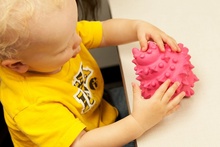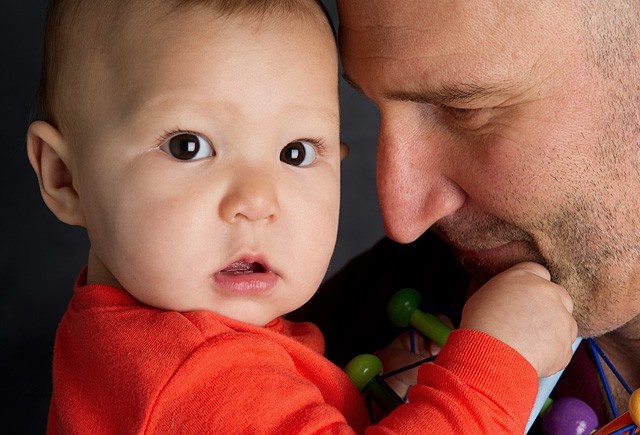UI research funding again tops $400 million
The University of Iowa eclipsed $400 million in external funding for research for the fourth consecutive year, continuing a trend of successfully competing for federal and other sources of money despite the end of federal stimulus funds and tight budgets affecting government, the philanthropic, and private sectors.
The UI’s total share of external funding for fiscal 2012 was $438 million. Excluding short-term stimulus funding from the American Recovery and Reinvestment Act last year and this year, total external funding increased 3.2 percent over fiscal 2011. UI researchers also landed 2,124 grant and contract awards, the most ever when excluding stimulus-funded projects.
Read more: now.uiowa.edu/2012/07/ui-research-funding-again-tops-400-million
Newly identified gene network restores function of cystic fibrosis protein
Researchers at the UI Carver College of Medicine have discovered a genetic process that can restore function to a defective protein, which is the most common cause of cystic fibrosis (CF).
Read more: now.uiowa.edu/2012/07/cystic-fibrosis-discovery

UI study finds that spatial consistency helps tots learn words
Parents of young children often stock up on educational products like Baby Einstein videos, but a recent UI study has found that applying "spatial consistency" may be the best way help toddlers build their vocabularies—and it's free and easy.
Read more: now.uiowa.edu/2012/05/coming-terms
Breaking new ground in reading development research
Many educators have long believed that when words differ on only one sound, early readers can learn the rules of phonics by focusing on what is different between the words. Scientists at the UI are turning that thinking on its head. A recent study shows certain kinds of variation in words may help early readers learn better.
Read more: now.uiowa.edu/2012/10/rethinking-reading

Parental bonding=happy, stable child
Parents: Want to help ensure your children turn out to be happy and socially well adjusted? Bond with them when they are infants. That’s the message from a study by the UI, which found that infants who have a close, intimate relationship with a parent are less likely to be troubled, aggressive, or experience other emotional and behavioral problems when they reach school age.
Surprisingly, the researchers found that a young child needs to feel particularly secure with only one parent to reap the benefits of stable emotions and behavior, and that being attached to dad is just as helpful as being close to mom.
Read more: now.uiowa.edu/2012/10/parental-bonding-makes-happy-stable-child
Giving people rewards uncovers true motivations
Money is great for buying stuff, but a new study by UI finance professors suggests it's also useful for keeping score and might help people make better decisions.
"If you offer incentives to people, it generates more economically rational decisions," says Thomas Rietz, professor of finance in the Tippie College of Business. "The incentive doesn't even have to be money. If it's just a way to keep score, it still makes a difference."
Without any kind of incentive, he said peoples' decisions may seem irrational and have little logical connection.
Read more: now.uiowa.edu/2012/10/iowa-researchers-find-giving-people-rewards-uncovers-true-motivations
New finding may help scientists eliminate diabetes drug's adverse side effects
A UI team has discovered a new biological pathway in blood vessel cells, which may contribute to the blood pressure-lowering effects of TZD drugs used to treat type 2 diabetes. This finding may help to develop new therapies that retain the beneficial effect of TZDs but eliminate the adverse side effects.
Read more: now.uiowa.edu/2012/10/ui-research-may-help-build-better-drug
New eyes in the sky
Until now, scientists who study air pollution using satellite imagery have been limited by weather. Clouds, in particular, provide much less information than a sunny day.
UI scientists have created a technique to help satellites "see" through the clouds and better estimate the concentration of pollutants, such as soot. The finding is important, because, like GPS systems, clouds block remote-sensing satellites' ability to detect, and thus calculate, the concentration of pollution nearer to the ground. This includes particles (commonly known as soot) that reduce air quality and affect weather and climate.
The results of the study are published July 9 in the online early edition of the journal Proceedings of the National Academy of Sciences.
Read more: now.uiowa.edu/2012/07/new-eyes-sky
Grant to bolster research on late life depression
Marianne Smith, assistant professor in the UI’s College of Nursing, was recently awarded a five-year Research Project Grant from the National Institute of Nursing Research at the National Institutes of Health. The grant will provide more than $3 million in funding for Smith’s research project, which is titled “Improving Mood in Assisted Living Using a Cognitive Training Intervention.”
During this study, Smith and her team will take a closer look at late life depression, which affects 24 percent of assisted living (AL) residents and often interacts with other social and health problems to cause a downward disability spiral that is costly to both older individuals and society.
Read more: now.uiowa.edu/2012/10/grant-bolster-smith’s-research-late-life-depression

Celebrating giftedness, supporting difficulties
Just because you’re really smart doesn’t mean you are supremely self-confident. That’s according to UI researchers who report that gifted children with attention deficit hyperactivity-disorder (ADHD) have lower self-esteem than their intellectual peers.
It’s the first study to examine how gifted students with and without a behavioral disorder like ADHD feel about themselves, the researchers report in the paper, published in the September edition of the Journal for the Education of the Gifted.
Read more: now.uiowa.edu/2012/09/celebrating-giftedness-supporting-difficulties
The roots of human self-awareness
A research team led by the UI has upended current thinking about areas in the human brain responsible for self-awareness. Pointing to the example of a rare patient with damage to areas long considered vital to the phenomenon, the researchers propose that self-awareness stems from a diffuse patchwork of pathways in the brain, rather than specific areas.
Read more: now.uiowa.edu/2012/08/roots-human-self-awareness
Why are elderly duped? UI team pinpoints where doubt arises in human mind
Researchers at the UI have pinpointed for the first time the area in the human brain where doubt arises. The finding helps explain why older people, as well as others with damage to a specific brain region, are more prone to fall victim to deception and scams. Results published in the journal Frontiers in Neuroscience.
Read more: now.uiowa.edu/2012/08/why-are-elderly-duped-ui-researchers-explain-why
Survey: Iowa's children are healthy, feel safe
Iowa's children are healthy, happy, and feel safe in their communities and in their schools. Those are the findings from a UI-led survey of children and households in the state. The 2010 Iowa Child and Family Household Health Survey is the only statewide, population-based study of the health and well being of the state’s children.
Read more: now.uiowa.edu/2012/07/survey-iowas-children-are-healthy-and-feel-safe
Researchers identify key culprit causing muscle atrophy
Researchers at the UI have identified a key protein that causes muscles to atrophy. The protein, Gadd45a, is responsible for 40 percent of the gene activity associated with muscle deterioration. The finding opens the door to therapies to block Gadd45a and thus to deter muscle atrophy. Results appear in the Journal of Biological Chemistry.
Read more: now.uiowa.edu/2012/08/researchers-identify-key-culprit-causing-muscle-atrophy
Infants of overweight mothers grow more slowly
Babies born to overweight mothers gain less weight and grow more slowly than those born to normal-weight mothers, a UI study has found. But they do catch up, meaning that pediatricians should refrain from boosting their nutrition, which could make matters worse. Results appear in the Journal of Pediatrics.
Read more: now.uiowa.edu/2012/08/infants-overweight-mothers-grow-more-slowly
Wrecks and effects: UI study finds fewer fans watching NASCAR for the crashes
A study by a UI economist finds that many car race fans do, indeed, watch NASCAR races because they want to see car wrecks, but more of them have been tuning in to see who actually wins the race since the circuit adopted its Chase for the Cup championship series in 2004.
Read more: now.uiowa.edu/2012/07/wrecks-and-effects

Just how much 'secondhand TV' do kids experience?
Deborah Linebarger knew that American children were exposed to a lot of television. What she didn’t know was the sheer amount of background television that the average American child is exposed to per day.
Linebarger, associate professor in the UI College of Education’s Department of Teaching and Learning, was part of a team that conducted the first nationwide study to provide accurate estimates of background television exposure to children.
Read more: now.uiowa.edu/2012/05/background-buzz
UI team develops new way to look at brain function
UI neuroscientist John Wemmie is interested in the effect of acid in the brain (not that kind of acid!). His studies suggest that increased acidity—or low pH—in the brain is linked to panic disorders, anxiety, and depression. But his work also indicates that changes in acidity are important for normal brain activity too.
Read more: now.uiowa.edu/2012/05/acid-brain

UI professor identifies largest known crocodile
A crocodile large enough to swallow humans once lived in East Africa, according to UI researcher Christopher Brochu whose paper on the discovery of a new crocodile species that was published in the May 3 issue of the Journal of Vertebrate Paleontology.
Read more: now.uiowa.edu/2012/04/ui-professor-identifies-largest-known-crocodile
The case of the epileptic flies
Scientists have studied the prickle gene mutation in flies since the 1930s, but only a couple winters ago did anyone realize these flies had epilepsy. The discovery could provide a new testing route for human treatments.
Read more: now.uiowa.edu/2012/03/case-epileptic-flies
Law school restores Illinois slavery history
Law professor Lea VanderVelde is working with the Illinois State Archives to make the agency's online servitude and emancipation records database more complete and accurate.
Read more: now.uiowa.edu/2012/02/law-school-restores-illinois-slavery-history
Engineering a better hip implant
A research team at the UI has engineered a better design for hip implants for obese patients. The team learned that thigh size is a reason why hip implants fail, and why it contributes to an increased rate of failure for the morbidly obese. Results are published in the journal Clinical Orthopaedics and Related Research.
Read more: now.uiowa.edu/2012/09/engineering-better-hip-implant
Friends in workplaces
A sense of belonging and attachment to a group of co-workers is a better motivator for some employees than money, according to a new study by UI researchers.
“We found that self-managing teams exhibit increased performance when they are highly cohesive,” says Greg Stewart, Henry B. Tippie Research Professor of Management and Organizations in the UI Tippie College of Business. “Peer pressure is a strong motivating force, and workers’ willingness to please people who mean something to them is often a stronger motivating force than financial rewards.”
Read more: now.uiowa.edu/2012/07/friends-workplaces
This is your brain on no self-control
A study by UI neuroscientist and neuro-marketing expert William Hedgcock confirms previous studies that show self-control is a finite commodity that is depleted by use. Once the pool has dried up, we’re less likely to keep our cool the next time we’re faced with a situation that requires self-control.
But Hedgcock’s study is the first to actually show it happening in the brain using fMRI images that scan people as they perform self-control tasks.